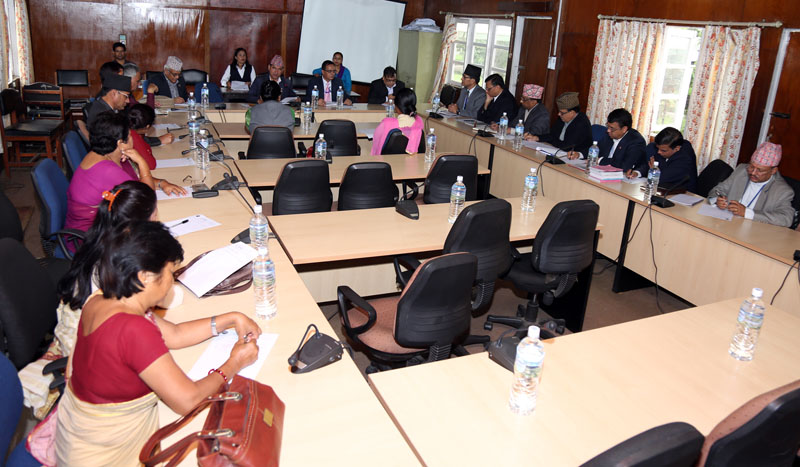Government asked to table subordinate bills in House
- Dilemma on whether or not to bring a supplementary budget is the cause for delay
Kathmandu, September 8
The government has been instructed to table the budget-related bills in the Parliament at the earliest. A meeting of the Finance Committee of the Legislature-Parliament, today, instructed the Ministry of Finance to table the bills related to the fiscal budget 2016-17 namely, Loan and Guarantee Bill, Bill to Raise Domestic Debt and Finance Bill.
The budget for fiscal 2016-17 presented by the previous KP Oli-led government and two bills, namely, Vote on Account Bill and Appropriation Bill were endorsed by the parliament. But the Loan and Guarantee Bill, Bill to Raise Domestic Debt and Finance Bill could not be endorsed in the House as the then government’s ally CPN Maoist Centre and the main opposition Nepali Congress decided to vote against the bills.
Even after a month of the formation of the new government led by CPN Maoist Centre, the government has not yet submitted the three aforementioned bills in the parliament for approval. It is reported that the government has been preparing to make amendments to the Bill to Raise Domestic Debt and Finance Bill to raise additional debt to finance the supplementary budget that the government is planning to introduce.
The earlier government had planned to raise domestic debt worth Rs 111 billion, so there is a cushion for new government to raise domestic debt. But consequently, raising more debt by the government affects spending capacity of private sector.
The dilemma that the new government faces on whether or not to bring a supplementary budget is the cause for delay in the submission of the subordinate bills in the Parliament for approval. Submitting the same bills in the Parliament by the finance minister, who belongs to the CPN Maoist Centre that had rejected it earlier, could also raise questions of his morality.
But the instruction from the House panel today has put pressure on the government to submit the bills without delay.
“As the major bill — Appropriation Bill — has already been endorsed from the Parliament, there is no logic behind taking more time to table the subordinate bills,” said Prakash Jwala, chair of the Finance Committee.
Due to lack of Finance Bill, which allows the government to collect taxes, the government has been collecting taxes under the provision of Periodic Tax Recovery Act. The act extends authority to the government to impose new tax rates even before the Finance Bill is approved by the Parliament. As per the act, the government can introduce new tax rates by publishing a notice in Nepal Gazette. The validity of notices published in the gazette lasts for six months, which means the new government has to revise and ratify the Finance Bill by then.
Part of the Financial Bill came into effect on the day the budget was presented in the Parliament on May 28. This has enabled the government to collect many indirect taxes, such as customs and excise duties, as per the revisions proposed by the new Finance Bill.
If the government makes amendments to the Finance Bill before submitting it to the Parliament, it will have to reimburse taxpayers the funds that were collected from the day the new duties came into effect, as per the provision of the act. But if the tax rates are revised upwards while revising the rejected Finance Bill, the government cannot ask taxpayers to pay extra funds.
Another bill that needs to be submitted to the Parliament is Loan and Guarantee Bill, which allows the government to borrow funds from abroad, or from sources like multilateral donors and other foreign financial institutions. This bill has proposed that government’s foreign debt ceiling be raised to Rs 700 billion from the existing Rs 500 billion. Similarly, the Bill to Raise Public Debt is needed to mobilise loans from within the country.






